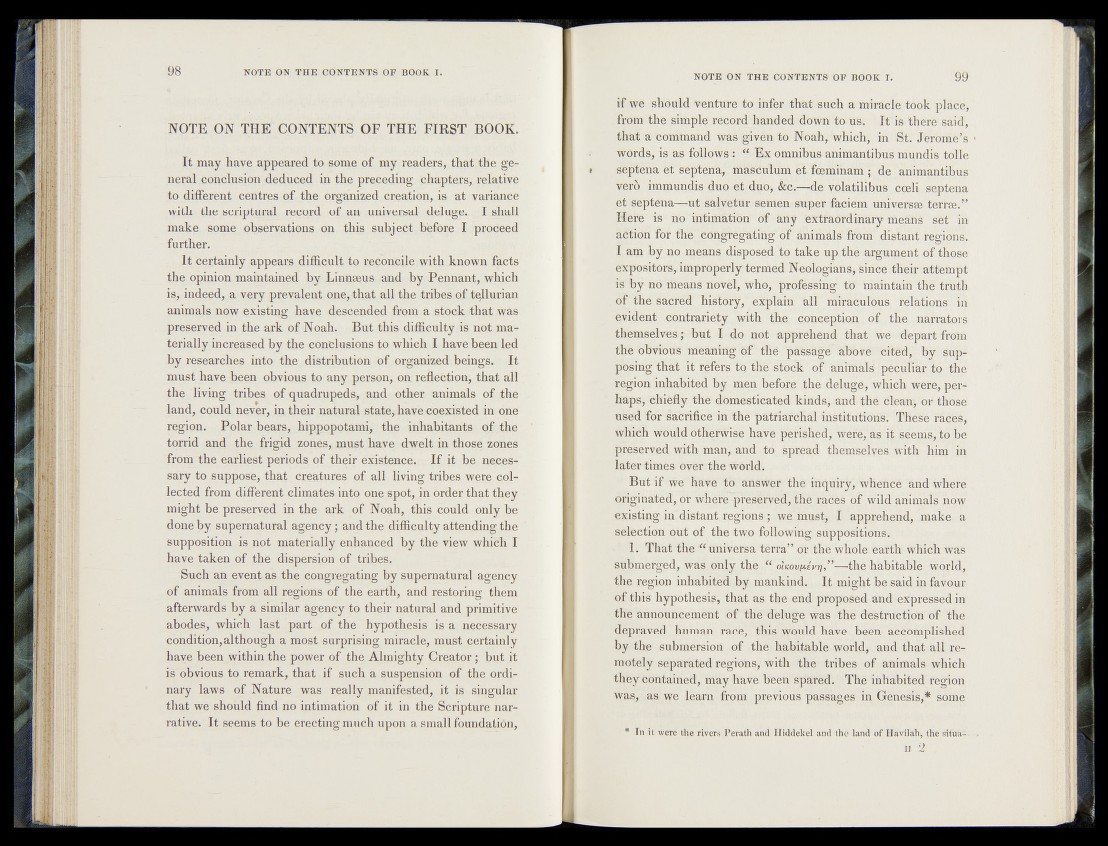
NOTE ON THE CONTENTS OF THE FIRST BOOK.
It may have appeared to some of my readers, that the general
.conclusion deduced in the preceding chapters, relative
to different centres of the organized creation, i s . at variance
with the scriptural record of an universal deluge. I shall
make some observations on this subject before I proceed
further.
It Certainly appears difficult to reconcile with known Facts
the opinion maintained by Linnams and by Pennant, which
is, indeed, a very prevalent one, that all the tribes of tellurian
animals now existing have descended from a stock that was
preserved in the ark of Noah. But this difficulty's net materially
increased by the conclusions to which I have been led
by researches into the distribution of organized beings. I t
must have been obvious to any person, on reflection, that all
the living tribes of quadrupeds, and other animals of the
land, could never, in their natural state, have coexisted in one
region; Polar bears, hippopotami, the inhabitants of the
torrid and the frigid zones, must have dwelt in those zones
from the earliest periods of their existence. I f itgbe neees->
sary to suppose, that creatures of all living tribes were collected
from different climates into one spot, in order that- they
might be preserved in th e ark of Noah, this could only be
done by supernatural agency ; and the difficulty attending the
supposition is not materially enhanced by the view which I
have taken of the dispersion of tribes.
Such an event as the congregating by supernatural agency
of animals from all regions of the earth, and restoring them
afterwards by a similar agency to their natural and primitive
abodes, which last p a r t. of the hypothesis is a .necessary
condition, although a most surprising miracle, must certainly
have beenyvithin the power of the Almighty Creator ; but it
is'obvious to remark, that if such a suspension of the ordinary
laws of Nature was really manifested, it is singular
that we should find no intimation of it in the Scripture narrative.
It seems to be erecting much upon a small foundatiôn,
if we should venture to infer that such a miracle took place,
from the simple record handed down to us. It is ’thére said,
that a cohrtnand was givén to Noah, which','. in St. Jerome’s
< words, is as follows : “ Ex omnibus animantibus mundis tolle
» Septena et'séplénafymasculum et foemiham ; de animantibus
yprb irnmundis dup;,et duo, &c.~de vplatilibus cceli septena
&t Septena—ut salvetur semen super fhciem uoiversse terlae.-’
Here is no intimation of any extraordinary mealriS sie't1 in
é-cïrom for the congregating of animals ‘from ‘ distant regions.
I . am by ne^means disposed io take up the argument of those
expositors;,. improperly termed Neologiansj since their attempt
is by no djtearis novel, who, professing to' maintain the truth
’«;i; of"the sacred history, “explain all miraculous relations" in
4$ident contrariety with the conception of the narrators
themselves ; but I do not apprehend th a t we depart from
the 'óbvióuè biteaftirig of the passage^abbvêw’ citèd, by supposing
that to‘ the stock of animal^; peculiar to the
region inhabited by men before the deluge, which were, per-
1 haps, chiefly the domesticated kinds, and thé clean; of those
used fof stfêhifieefln the patriarchal institution^; Thesè ’faqtes,
which would otherwise have perished^ were, as it seems, to be,
preserved with man, and to spread themseiy.es with him in
later times?Oyfïrtlie world.
But if We havé to anSWef the inquiry, ‘'whe'néé 'and where
originated, of where-preserved, the races of wild animalf .now
existing in'distant regions; we! must* I apprehend, make a
selection out of the two following suppositions. -■
1. That the “ uni versa terra” of the Whole éafth which was
submerged, was,,Only the “ olKov^évr),’y—ihe, habitable world,
the region inhabited by mankind. It vmight be said in favour
of this hypothesis, that as theendpfopoSed and? expressed in
the annóhficeméttt Öf'Ibiê delude WaS the dbSfrOctioif bf the
depraved human race, this would have , been accomplished
by the submersion of the habitable world, and that all re-;
raotely separated regions, with the tribes of animals which
they contained, may have beeff spared. The inhabited region
was, as we learn from previous "passages ' in' GeoèMs,* some
* In it were the rivers Perafh and Hiddekel and the land of Havilah, the sifttai